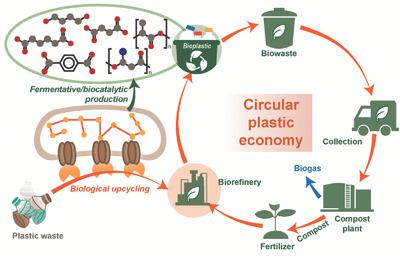当前位置:
X-MOL 学术
›
Biotechnol. J.
›
论文详情
Our official English website, www.x-mol.net, welcomes your
feedback! (Note: you will need to create a separate account there.)
Recent Advances in Sustainable Plastic Upcycling and Biopolymers.
Biotechnology Journal ( IF 3.2 ) Pub Date : 2020-03-12 , DOI: 10.1002/biot.201900489 Yu Jung Sohn 1 , Hee Taek Kim 2 , Kei-Anne Baritugo 1 , Seo Young Jo 1 , Hye Min Song 1 , Se Young Park 1 , Su Kyeong Park 1 , Jiwon Pyo 1 , Hyun Gil Cha 3 , Hoyong Kim 3 , Jeong-Geol Na 4 , Chulhwan Park 5 , Jong-Il Choi 6 , Jeong Chan Joo 2 , Si Jae Park 1
Biotechnology Journal ( IF 3.2 ) Pub Date : 2020-03-12 , DOI: 10.1002/biot.201900489 Yu Jung Sohn 1 , Hee Taek Kim 2 , Kei-Anne Baritugo 1 , Seo Young Jo 1 , Hye Min Song 1 , Se Young Park 1 , Su Kyeong Park 1 , Jiwon Pyo 1 , Hyun Gil Cha 3 , Hoyong Kim 3 , Jeong-Geol Na 4 , Chulhwan Park 5 , Jong-Il Choi 6 , Jeong Chan Joo 2 , Si Jae Park 1
Affiliation

|
Advances in scientific technology in the early twentieth century have facilitated the development of synthetic plastics that are lightweight, rigid, and can be easily molded into a desirable shape without changing their material properties. Thus, plastics become ubiquitous and indispensable materials that are used in various manufacturing sectors, including clothing, automotive, medical, and electronic industries. However, strong physical durability and chemical stability of synthetic plastics, most of which are produced from fossil fuels, hinder their complete degradation when they are improperly discarded after use. In addition, accumulated plastic wastes without degradation have caused severe environmental problems, such as microplastics pollution and plastic islands. Thus, the usage and production of plastics is not free from environmental pollution or resource depletion. In order to lessen the impact of climate change and reduce plastic pollution, it is necessary to understand and address the current plastic life cycles. In this review, “sustainable biopolymers” are suggested as a promising solution to the current plastic crisis. The desired properties of sustainable biopolymers and bio‐based and bio/chemical hybrid technologies for the development of sustainable biopolymers are mainly discussed.
中文翻译:

可持续塑料升级和生物聚合物的最新进展。
二十世纪初期,科学技术的进步促进了轻质,刚性且可以容易地模制成所需形状而不改变其材料性能的合成塑料的发展。因此,塑料成为在包括服装,汽车,医疗和电子工业在内的各种制造部门中使用的普遍和必不可少的材料。但是,合成塑料的强物理耐久性和化学稳定性(其中大部分是由化石燃料生产的)在使用后不当丢弃时,会阻碍其完全降解。此外,积累的塑料废物没有降解,已经引起了严重的环境问题,例如微塑料污染和塑料岛。从而,塑料的使用和生产不能避免环境污染或资源枯竭。为了减轻气候变化的影响并减少塑料污染,有必要了解和解决当前的塑料生命周期。在这篇综述中,“可持续的生物聚合物”被建议作为解决当前塑料危机的有希望的解决方案。主要讨论了可持续生物聚合物以及生物基和生物/化学混合技术对可持续生物聚合物发展的期望特性。
更新日期:2020-03-12
中文翻译:

可持续塑料升级和生物聚合物的最新进展。
二十世纪初期,科学技术的进步促进了轻质,刚性且可以容易地模制成所需形状而不改变其材料性能的合成塑料的发展。因此,塑料成为在包括服装,汽车,医疗和电子工业在内的各种制造部门中使用的普遍和必不可少的材料。但是,合成塑料的强物理耐久性和化学稳定性(其中大部分是由化石燃料生产的)在使用后不当丢弃时,会阻碍其完全降解。此外,积累的塑料废物没有降解,已经引起了严重的环境问题,例如微塑料污染和塑料岛。从而,塑料的使用和生产不能避免环境污染或资源枯竭。为了减轻气候变化的影响并减少塑料污染,有必要了解和解决当前的塑料生命周期。在这篇综述中,“可持续的生物聚合物”被建议作为解决当前塑料危机的有希望的解决方案。主要讨论了可持续生物聚合物以及生物基和生物/化学混合技术对可持续生物聚合物发展的期望特性。











































 京公网安备 11010802027423号
京公网安备 11010802027423号